USA Gymnastics Sex Abuse News Turns Law School Talk Into Call to Action
Following a week of sexual abuse horrors revealed in a Michigan courtroom, the University of Georgia law school hosted an open discussion Saturday about taking legal action against predators and those who enable them.
January 29, 2018 at 04:50 PM
9 minute read
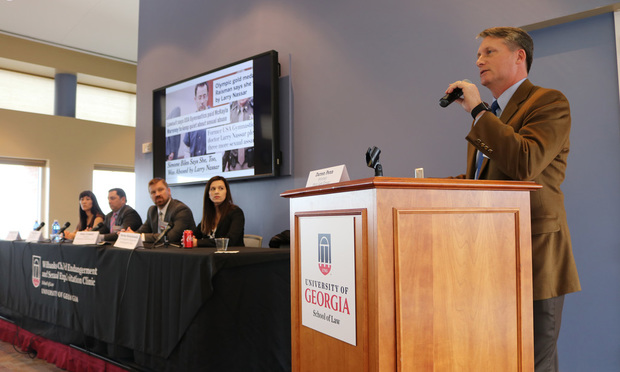
Following a week of sexual abuse horrors revealed in a Michigan courtroom, the University of Georgia law school hosted an open discussion Saturday about taking legal action against predators and those who enable them.
An Indianapolis Star reporter and three lawyers—two from Georgia—talked about how they worked together to uncover abuse of young girls by coaches and Olympics and Michigan State University ex-team doctor Larry Nassar.
Darren Penn of Penn Law Group and former president of the Georgia Trial Lawyers Association moderated the panel. The discussion revolved around the work of Indianapolis Star reporter Marisa Kwiatkowski, a panelist, and her colleagues Mark Alesia and Tim Evans. The three lawyers who sat with her on the panel all worked with her on the investigation that led to the “Out of Balance” series published by the Star, USA Today and other Gannett Company newspapers.
The program, titled “USA Gymnastics: A Legal and Media Collaboration to Expose Institutional Abuse,” capped off the second annual conference of the Wilbanks Child Endangerment and Sexual Exploitation Clinic, known as CEASE. It's the first program of its kind in the country and has been sharing information with attorneys and advocates from other states.
The audience Saturday included CEASE clinic founder Marlan Wilbanks of Wilbanks & Gouinlock in Atlanta, UGA law school dean Peter “Bo” Rutledge and CEASE clinic director Emma Hetherington.
“I planned this six months ago,” Hetherington said in a hallway just before the program started in a full meeting room at the Dean Rusk Center for International Law. She added she had no idea how timely it would turn out to be.
Judge Rosemarie Aquilina of Ingham County Circuit Court in Michigan captured the world's attention Wednesday when she sentenced Nassar to up to 175 years in prison, combining the time with that from an earlier guilty plea in federal court. But first, the judge allowed testimony from everyone with a story to tell about Nassar's abuse: 156 women spoke.
The panelists said Saturday that the abuse addressed in the Michigan courtroom last week is only the beginning. They expect criminal charges to be followed by civil litigation against organizations that failed to report complaints.
Asked how many people have filed related lawsuits around the country, Kwiatkowski answered: “More than 100.”
The first was filed in Georgia by one of the lawyers on the panel, W. Brian Cornwell of Cornwell & Stevens in Savannah. Cornwell said he got the lawsuit in 2005 because he knew the family involved. The child was only 11, so he waited to file the lawsuit until 2013, when she was 18. “Trials are hard,” he said.
Cornwell's client is identified as Jane Doe in the lawsuit against USA Gymnastics and one of its coaches, William McCabe, who is now serving time in a Fort Dix, New Jersey, federal prison for child sexual abuse in another case.
The lawsuit alleges that leaders at the USA Gymnastics Indianapolis headquarters had received complaints about McCabe sexually abusing young girls since 1998 but had done nothing to disqualify him as a coach until he was convicted of such crimes in 2006. Those complaints were part of a secret file that Cornwell sought in discovery.
After a motion hearing and trips to Indianapolis to examine the complaints, Cornwell said he persuaded Georgia's Effingham County State Court Judge Ronald Thompson to compel USA Gymnastics to produce the documents. But they were filed under seal as part of a consent order.
Enter another of the panelists, S. Derek Bauer of Baker & Hostetler's Atlanta office. The Indianapolis Star hired Bauer and partner Ian Byrnside to try and persuade the judge to unseal the file. But it took nearly a year until the Georgia Supreme Court turned down USA Gymnastics in two different efforts to block Thompson's order unsealing the documents.
Meanwhile, the Indy Star began reporting on the case and complaints about other coaches that had been kept quiet. One of the lawyers on the panel was also a source for the Indy Star investigation.
Courtney Kiehl, a Los Angeles lawyer, said she started an advocacy group called Abused Children Heard Everywhere Foundation because she needed to “make something good happen” from her experience as a survivor of sexual abuse by her gymnastics coach. She said it was learning that other girls were also being abused that led her to tell her parents and report the coach when she was only 13.
Year later, while studying at Penn State, she said she got a call from Kwiatkowski, who came to Philadelphia to interview her.
After the paper published “Out of Balance,” a former gymnast emailed to report she had been sexually assaulted, not by a coach but by Nassar, who was a team doctor for USA Gymnastics, the Olympics and Michigan State University. She had complained and had been ignored.
Others came forward after that with the same story, according to the Indy Star's published reports.
One of the most chilling moments in the discussion came when Kiehl showed a welcome letter she was given as a young girl participating in a USA Gymnastics camp called the Talent Opportunity Program, known as TOPs. The program is for girls aged 7 to 10. The letter directed them to follow instructions without question. And they were told, if they had any problems or concerns in their rooms at night, not to tell their coaches but instead call camp doctor Larry Nassar.
Defending USA Gymnastics in the Georgia lawsuit is Michael Athans of Freeman Mathis & Gary in Atlanta. Athans said Friday that he could not comment on the case without permission from his client. Later in the day, he said he had not been able to connect with USA Gymnastics CEO Kerry Perry due to her prior commitments.
Perry took over as president and CEO on Dec. 1, 2017. The organization has now entirely replaced its leadership since the Jane Doe lawsuit began. Perry posted a statement on the website Wednesday saying, in part: “During the last seven days, more than 150 courageous women have shared their deeply personal experiences and how Larry Nassar's despicable crimes impacted their lives. I am profoundly saddened that a single woman, a single girl, a single athlete was hurt. USA Gymnastics applauds Judge Rosemarie Aquilina for handing Nassar the maximum sentence of up to 175 years, in an effort to bring justice to those he abused and punish him for his horrific behavior.”
Perry repeated her promise to “focus each and every day on our organization's highest priority—the safety, health and well-being of our athletes.” She pledged to “create a culture that empowers and supports them. Our commitment is uncompromising, and it is my hope that everything we do going forward makes this very clear.”
Much of the discussion in Athens Saturday focused on efforts to help survivors find justice by strengthening Georgia's Hidden Predator Act. The law only temporarily lengthened the statute of limitations on filing civil lawsuits, but that window has closed. And the law let institutions off the hook, leaving judges to toss lawsuits against scouting organizations and churches where complaints of child sexual abuse had allegedly gone unreported.
The panelists said institutions should be held accountable and the statute of limitations should be extended permanently.
“Right now, if you're 18, you have until you're 20 to file suit,” Cornwell said. “The science tells us that people aren't able to talk about this until they're older.”
The statute of limitations is not an issue for Cornwell's Jane Doe lawsuit, because he filed before it expired, but it would be for most survivors, who typically don't disclose until they have grown up, married or had children the age they were when they were abused.
“This is an epidemic problem, and, until we address it, it's never going to change,” Cornwell said. “You've got to hit people in the pocketbook.”
The other panelists and the moderator agreed. “The civil justice system is the greatest regulator,” Penn said.
Bauer, a longtime First Amendment lawyer, encouraged CEASE and others working for justice to partner with journalists. “Sunshine is the best disinfectant for bad behavior,” Bauer said. “Sunlight brought all those people to Marisa's door.”
The program ended in a kind of call to action for strengthening laws to help protect children and give survivors justice through civil litigation. Said Penn in conclusion: “I'm all in.”
Penn repeated a theme from the keynote speech Saturday by C.T Wilson, an attorney and member of the Maryland House of Delegates who persuaded his colleagues to lengthen the statute of limitations for survivors of childhood sexual abuse to file lawsuits there. He talked about the pain of telling his own story of being sexually abused by an adoptive father. He told the story year after year until he finally succeeded in changing the law.
Quoting Wilson, Penn said, “Never give up. Never quit.”
Following another gathering and more discussion at a reception on the way out, Penn walked toward the North Campus parking deck to return to Atlanta and get back to work. He mentioned several survivor lawsuits he has pending, and a meeting with a private school defendant about one on Monday.
This content has been archived. It is available through our partners, LexisNexis® and Bloomberg Law.
To view this content, please continue to their sites.
Not a Lexis Subscriber?
Subscribe Now
Not a Bloomberg Law Subscriber?
Subscribe Now
NOT FOR REPRINT
© 2025 ALM Global, LLC, All Rights Reserved. Request academic re-use from www.copyright.com. All other uses, submit a request to [email protected]. For more information visit Asset & Logo Licensing.
You Might Like
View All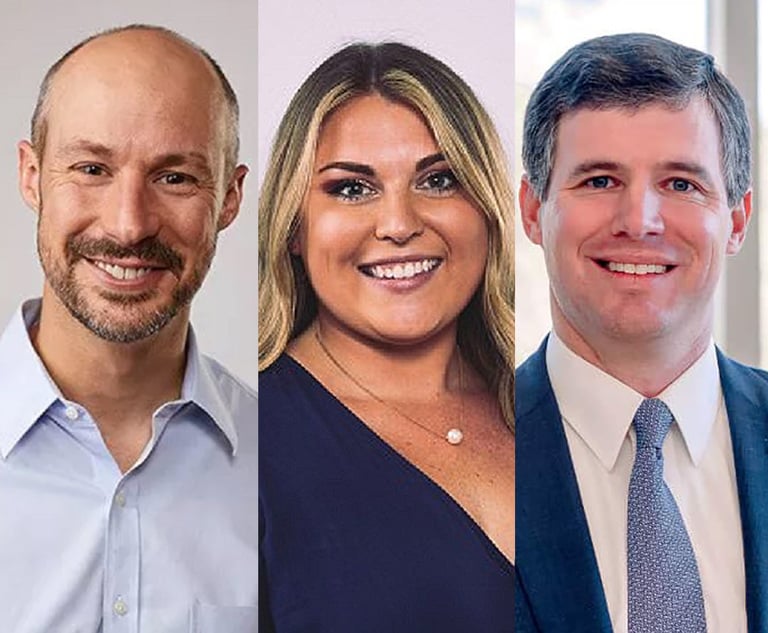
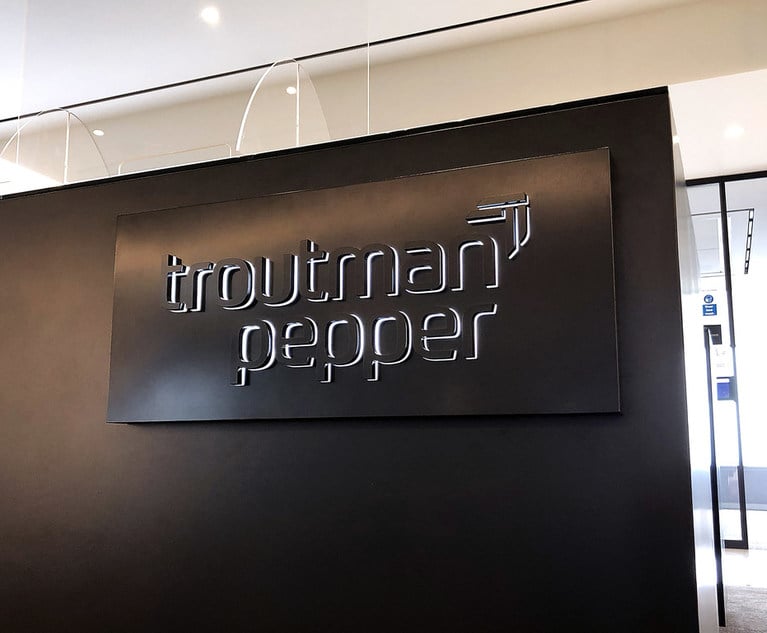
Troutman Pepper Says Ex-Associate Who Alleged Racial Discrimination Lost Job Because of Failure to Improve
6 minute read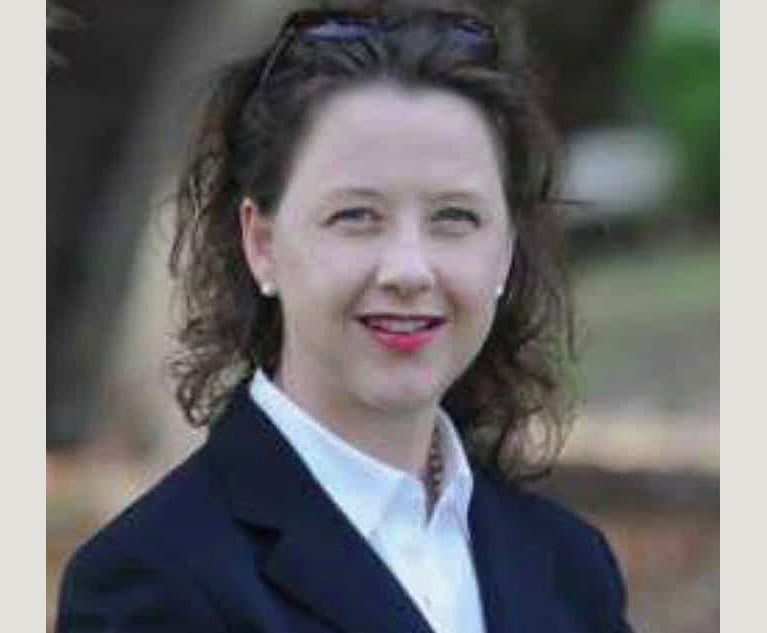
Judge Orders Acquittal of Ex-Prosecutor on 1 of 2 Counts in Misconduct Trial Over Ahmaud Arbery Case
3 minute read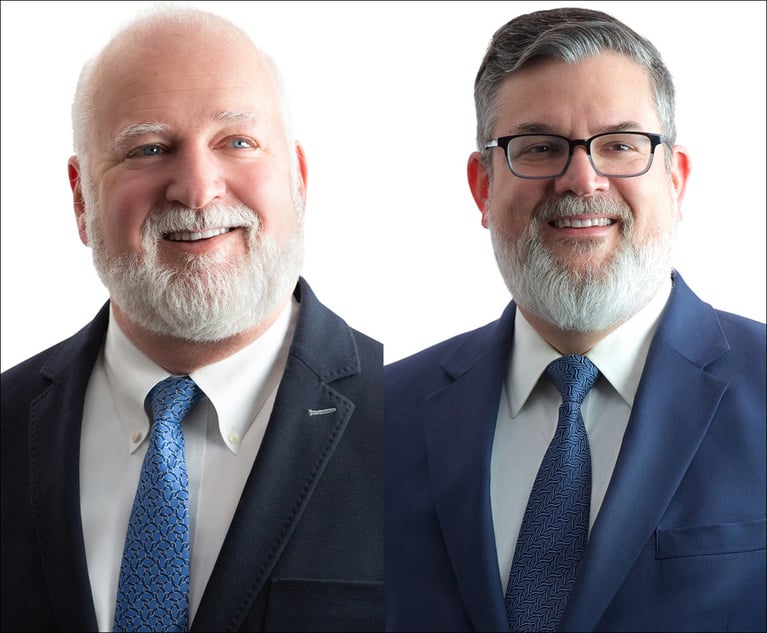
Trending Stories
- 1Conversation Catalyst: Transforming Professional Advancement Through Strategic Dialogue
- 2Trump Taps McKinsey CLO Pierre Gentin for Commerce Department GC
- 3Critical Mass With Law.com's Amanda Bronstad: 700+ Residents Near Ohio Derailment File New Suit, Is the FAA to Blame For Last Month's Air Disasters?
- 4Law Journal Column on Marital Residence Sales in Pending Divorces Puts 'Misplaced' Reliance on Two Cases
- 5A Message to the Community: Meeting the Moment in 2025
Who Got The Work
J. Brugh Lower of Gibbons has entered an appearance for industrial equipment supplier Devco Corporation in a pending trademark infringement lawsuit. The suit, accusing the defendant of selling knock-off Graco products, was filed Dec. 18 in New Jersey District Court by Rivkin Radler on behalf of Graco Inc. and Graco Minnesota. The case, assigned to U.S. District Judge Zahid N. Quraishi, is 3:24-cv-11294, Graco Inc. et al v. Devco Corporation.
Who Got The Work
Rebecca Maller-Stein and Kent A. Yalowitz of Arnold & Porter Kaye Scholer have entered their appearances for Hanaco Venture Capital and its executives, Lior Prosor and David Frankel, in a pending securities lawsuit. The action, filed on Dec. 24 in New York Southern District Court by Zell, Aron & Co. on behalf of Goldeneye Advisors, accuses the defendants of negligently and fraudulently managing the plaintiff's $1 million investment. The case, assigned to U.S. District Judge Vernon S. Broderick, is 1:24-cv-09918, Goldeneye Advisors, LLC v. Hanaco Venture Capital, Ltd. et al.
Who Got The Work
Attorneys from A&O Shearman has stepped in as defense counsel for Toronto-Dominion Bank and other defendants in a pending securities class action. The suit, filed Dec. 11 in New York Southern District Court by Bleichmar Fonti & Auld, accuses the defendants of concealing the bank's 'pervasive' deficiencies in regards to its compliance with the Bank Secrecy Act and the quality of its anti-money laundering controls. The case, assigned to U.S. District Judge Arun Subramanian, is 1:24-cv-09445, Gonzalez v. The Toronto-Dominion Bank et al.
Who Got The Work
Crown Castle International, a Pennsylvania company providing shared communications infrastructure, has turned to Luke D. Wolf of Gordon Rees Scully Mansukhani to fend off a pending breach-of-contract lawsuit. The court action, filed Nov. 25 in Michigan Eastern District Court by Hooper Hathaway PC on behalf of The Town Residences LLC, accuses Crown Castle of failing to transfer approximately $30,000 in utility payments from T-Mobile in breach of a roof-top lease and assignment agreement. The case, assigned to U.S. District Judge Susan K. Declercq, is 2:24-cv-13131, The Town Residences LLC v. T-Mobile US, Inc. et al.
Who Got The Work
Wilfred P. Coronato and Daniel M. Schwartz of McCarter & English have stepped in as defense counsel to Electrolux Home Products Inc. in a pending product liability lawsuit. The court action, filed Nov. 26 in New York Eastern District Court by Poulos Lopiccolo PC and Nagel Rice LLP on behalf of David Stern, alleges that the defendant's refrigerators’ drawers and shelving repeatedly break and fall apart within months after purchase. The case, assigned to U.S. District Judge Joan M. Azrack, is 2:24-cv-08204, Stern v. Electrolux Home Products, Inc.
Featured Firms
Law Offices of Gary Martin Hays & Associates, P.C.
(470) 294-1674
Law Offices of Mark E. Salomone
(857) 444-6468
Smith & Hassler
(713) 739-1250






